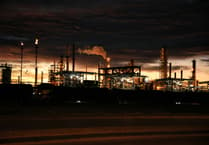The UK has been using gas from the North Sea for cooking and heating since the 1960s. It replaced coal and “town gas”, a gas made from coal that was piped to urban households via local, municipally owned networks.
“Natural gas” – the term used to distinguish this new gas from town gas – is methane, a fossil fuel. In the 1960s and 1970s, gas cookers and heaters had to be converted or replaced to use natural gas rather than town gas. In the 1980s, another innovation, gas central heating, replaced room heaters and the gas network was extended across the country.
The UK was self-sufficient in gas from the 1960s to the early 2000s when production declined as the UK’s North Sea gas reserves became depleted. Production has fallen by two-thirds in the last 20 years.
New reserves being licensed by the Government will only marginally slow the decline in production. The North Sea Transition Authority, responsible for maximising the economic recovery of oil and gas from the North Sea, predicts that gas production will fall by another two-thirds within ten years making the UK almost entirely reliant on gas imports.
We already import half the gas we use. We are increasingly competing with other European countries to buy gas from Norway, the US and Qatar, exposing us to international gas prices. Prices will likely remain high and volatile so long as most of Europe, which used to depend on Russian gas, is chasing the same supplies of gas.
Other European countries and even the US through the Inflation Reduction Act are taking steps to move away from gas to reduce their energy costs. They are investing in renewable energy, improving the energy efficiency of their buildings, and supporting households to come off gas and switch to electric cooking and heating.
In the US, electric heat pumps are outselling gas boilers. In Norway, the largest gas producer in Western Europe, two-thirds of homes are heated by heat pumps, where they work well in the cold Scandinavian winter. However, installations are still low in Germany where, similar to the UK, campaigns against heat pumps have dominated the press, arguing that heat pumps are inefficient in cold weather. Some of this negative campaigning has been linked to the gas industry itself.
Energy consultant, Dr Richard Lowes, of Exeter University says, “With nearly half of UK gas currently being used for heating, cleaning up heating should be seen as a UK energy security priority.” Despite our dwindling supplies, gas is still used for 84% of our heating needs and around 40% of our electricity generation.
Developing our own renewable energy and clean technology is more important than ever. Not only to reduce emissions and take us closer to meeting our climate targets, but also to shield the UK from international gas prices, which will go some way to alleviating the hardship of unaffordable energy bills and the cost of living crisis.




